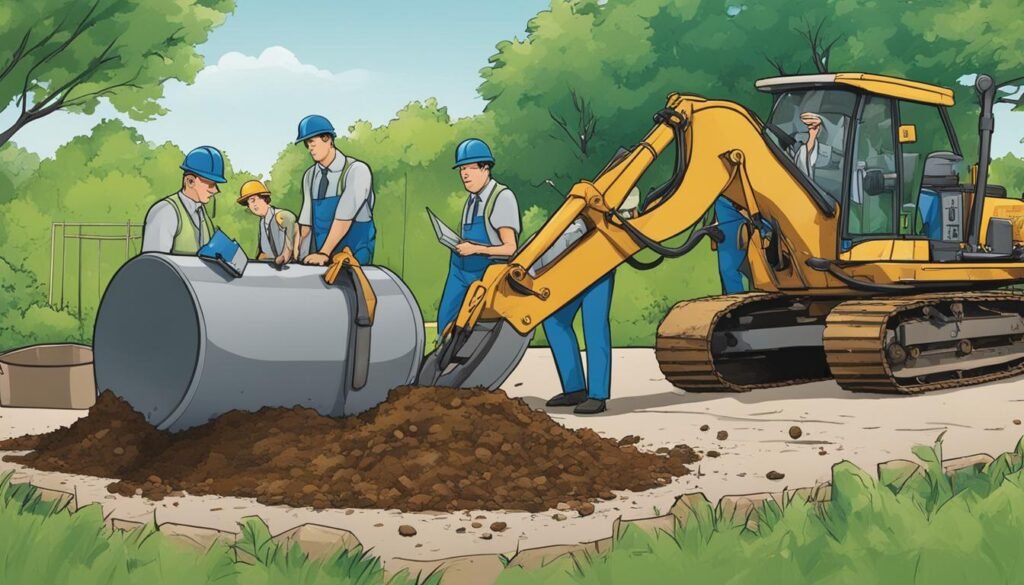Welcome to our article on illegal septic systems. In this section, we will provide you with a clear understanding of what constitutes an illegal septic system, helping you navigate the complex regulations and requirements that govern septic systems. Understanding the basics is crucial to ensure compliance with the law, protect public health, and preserve the environment.
Key Takeaways:
- An illegal septic system refers to a septic system that does not meet the necessary regulations and standards set by authorities.
- Illegal septic systems can lead to groundwater contamination, spread of diseases, property damage, and legal consequences.
- Penalties for operating an illegal septic system vary and can include fines, repairs, and even jail time.
- To report an illegal septic system, you can submit online forms or call the National Response Center.
- Regular maintenance of septic systems is crucial to prevent violations and protect the environment.
Why are Illegal Septic Systems a Concern?
Illegal septic systems pose significant risks to both property owners and the environment. These systems fail to meet the necessary regulations and standards set by local, state, or federal authorities, which can lead to severe consequences.
One of the primary concerns is the potential contamination of groundwater. Improperly functioning septic systems can allow untreated wastewater to seep into the ground, polluting the surrounding soil and potentially impacting nearby water sources. This contamination not only poses health risks to individuals and communities but also threatens the overall ecosystem and water supply.
In addition to environmental hazards, illegal septic systems can also cause property damage and legal consequences. Operating an illegal septic system can result in fines, mandatory system upgrades, and even forced removal and installation of a new system. Property damage can occur due to sewage backups and other system failures, leading to costly repairs and health hazards for inhabitants.
Identifying Illegal Septic Systems
Identifying illegal septic systems can be challenging, but there are a few signs to watch out for. One common indication is the absence of necessary permits and approvals from local authorities. Another clue is the presence of unlicensed contractors or unprofessional installation practices. Suspicious practices, such as discharge into surface waters or storm drains, can also indicate an illegal system. It’s essential to be vigilant and report any potential violations to the appropriate authorities.
Overall, addressing illegal septic systems is crucial to protect public health, the environment, and avoid legal consequences. By raising awareness and taking the necessary steps to identify and report these systems, we can ensure the proper functioning of septic systems and the overall well-being of our communities.
Consequences of an Illegal Septic System: Penalties and Regulations
Operating an illegal septic system can lead to serious penalties and repercussions. The specific consequences may vary depending on the jurisdiction and the severity of the violation. Common penalties for illegal septic systems include monetary fines, compulsory repairs or replacements of the system, and even potential jail time for repeat offenses. It is crucial for property owners to be aware of and comply with the regulations and requirements for septic systems in their area to avoid these consequences.
Understanding the regulations surrounding septic systems is essential to ensure compliance. Each state has its own set of regulations, often in collaboration with local health departments, that govern septic tank installation and maintenance. Failure to adhere to these regulations can result in violations and penalties. It is important for property owners to familiarize themselves with these regulations and obtain any necessary permits before installing or modifying a septic system.
In addition to penalties, illegal septic systems can also pose health, environmental, and financial risks. Neglecting maintenance and allowing a septic system to operate illegally can lead to system failures, groundwater contamination, and property damage. Regular maintenance, such as pumping the septic tank and conducting inspections, is crucial to ensure the proper functioning of the system and prevent violations. Timely repairs and addressing any issues promptly can help avoid potential legal consequences.
In summary, the consequences of operating an illegal septic system can be significant. Property owners should understand and comply with the regulations and requirements in their area to avoid penalties and protect public health and the environment. Regular maintenance and timely repairs are essential to prevent violations and ensure the proper functioning of the septic system. By following best practices and adhering to the regulations, property owners can avoid the financial, legal, and environmental risks associated with illegal septic systems.
How to Report an Illegal Septic System: Taking Action
If you come across an illegal septic system, it is important to take action and report it to the appropriate authorities. Reporting an illegal septic system not only helps prevent potential environmental disasters but also protects public health.
There are two main ways to report an illegal septic system. The first option is to report online through the Environmental Protection Agency (EPA) website. Simply fill out a form with relevant details and evidence, such as the location of the illegal system and any supporting documents or photographs. Providing as much information as possible will help the authorities investigate and address the issue effectively.
The second option is to call 911 if the situation requires immediate attention, such as a threat to human life. By contacting the National Response Center, you can report the illegal septic system and ensure that it is addressed promptly. Remember to document the location and signs of the illegal system, gather any additional information that may be helpful, and provide these details when reporting.
Gathering Evidence to Support Your Report
When reporting an illegal septic system, it is essential to gather evidence that supports your report. This can include photographs of the system, documents related to the installation or maintenance of the system, and any other relevant information you may have. Providing this evidence will strengthen your report and increase the chances of the authorities taking appropriate action against the violators.
Additionally, documenting the location and signs of the illegal system can be crucial in helping the authorities locate and address the issue. Note down any visible signs of pollution or damage, such as sewage odors, wastewater surfacing, or overflow. Include these details in your report to assist the authorities in their investigation.
Protecting Public Health and the Environment
Reporting an illegal septic system is not only about enforcement but also about safeguarding public health and the environment. By reporting these violations, you are contributing to the protection of groundwater, preventing the spread of diseases, and ensuring the proper functioning of septic systems.
Remember, taking action against illegal septic systems is an important responsibility that we all share. By reporting any illegal systems you come across, you are playing a vital role in maintaining a safe and healthy community.
The Importance of Regular Maintenance for Septic Systems
Regular maintenance is essential for septic systems to ensure their proper functioning and compliance with regulations. Neglecting maintenance can result in system failures, groundwater pollution, and potential legal violations.
One of the key reasons for regular maintenance is to prevent illegal septic system violations. By following recommended maintenance practices such as pumping the septic tank to remove accumulated solids and conducting inspections to identify any potential issues or repairs needed, property owners can ensure that their septic system is operating within the legal parameters.
Regular maintenance also helps to avoid costly repairs or replacements in the long run. By addressing any minor issues promptly, property owners can prevent them from escalating into major problems that may require extensive repairs or even the installation of a new septic system.
Preventing Illegal Septic System Installations
Another crucial aspect of regular maintenance is its role in preventing illegal septic system installations. By maintaining the system properly, property owners can ensure that it continues to meet the necessary regulations and standards set by the authorities. This includes complying with design and installation standards, conducting inspections, and following recommended maintenance schedules.
By actively maintaining their septic systems, property owners can protect public health, safeguard the environment, and avoid potential legal consequences associated with operating an illegal septic system.

Ensuring a Legal Septic System: Best Practices for Property Owners
As a responsible property owner, it is crucial to ensure that your septic system is legal and compliant with the necessary regulations. By following a few best practices, you can prevent illegal septic system installations and address any repairs or issues promptly.
The first step is to obtain the required permits before installing a septic system. Check with your local health department to understand the specific regulations in your area. By obtaining the necessary permits, you can ensure that your septic system meets the required design and installation standards.
Regular maintenance plays a vital role in preventing illegal septic system repairs. Schedule routine inspections and pumping of the septic tank to keep it in optimal condition. By addressing any identified issues or repairs promptly, you can prevent further damage and potential violations.
Finally, familiarize yourself with the local septic system regulations and comply with them. Understanding the rules surrounding septic systems in your area will help you avoid illegal septic system violations and protect public health and the environment.
FAQ
What is an illegal septic system?
An illegal septic system refers to a septic system that does not meet the necessary regulations and standards set by local, state, or federal authorities. This could include installing a septic system without proper permits, failure to meet required design and installation standards, inadequate maintenance and inspections, non-compliance with zoning laws, or unauthorized damage or alteration of the system.
Why are illegal septic systems a concern?
Illegal septic systems pose significant risks to both property owners and the environment. They can lead to the contamination of groundwater, spread of diseases, property damage, and legal consequences. Operating an illegal septic system can result in fines, mandatory system upgrades, and even forced removal and installation of a new system.
What are the consequences of an illegal septic system?
The penalties for operating an illegal septic system can vary depending on the jurisdiction and the severity of the violation. These penalties can include monetary fines, compulsory repairs or replacements of the system, and even jail time for repeat offenses.
How can I report an illegal septic system?
If you come across an illegal septic system, it is essential to report it to the appropriate authorities. You can report it online through the EPA website by filling out a form with relevant details and evidence. If the situation requires immediate attention, such as a threat to human life, you can call 911 and report it to the National Response Center.
Why is regular maintenance important for septic systems?
Regular maintenance is crucial for septic systems to ensure their proper functioning and compliance with regulations. Neglecting maintenance can lead to system failures, pollution of groundwater, and potential legal violations.
What are the septic system regulations and permits I should be aware of?
Septic system regulations and permits vary by state and local authorities. It is important to be aware of these regulations when installing a new septic system or making modifications to an existing one. Permits may be required before installing a septic tank, and site assessments may be conducted to determine the suitability of the soil for a conventional system or the need for an advanced system.
How can I ensure a legal septic system?
To ensure a legal septic system, property owners should follow best practices. This includes obtaining the necessary permits before installing a septic system, building a system that meets the required design and installation standards, regularly maintaining the system, and addressing any issues or repairs promptly.

